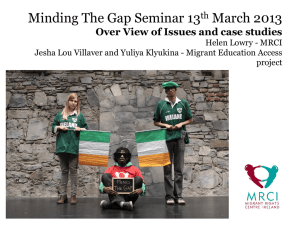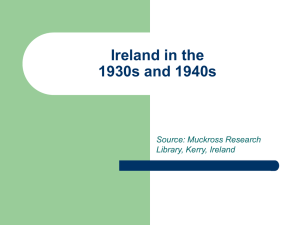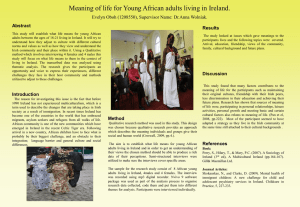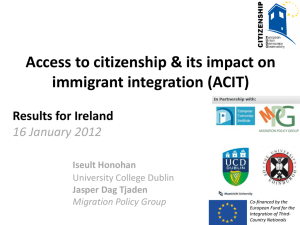naturalisation
advertisement
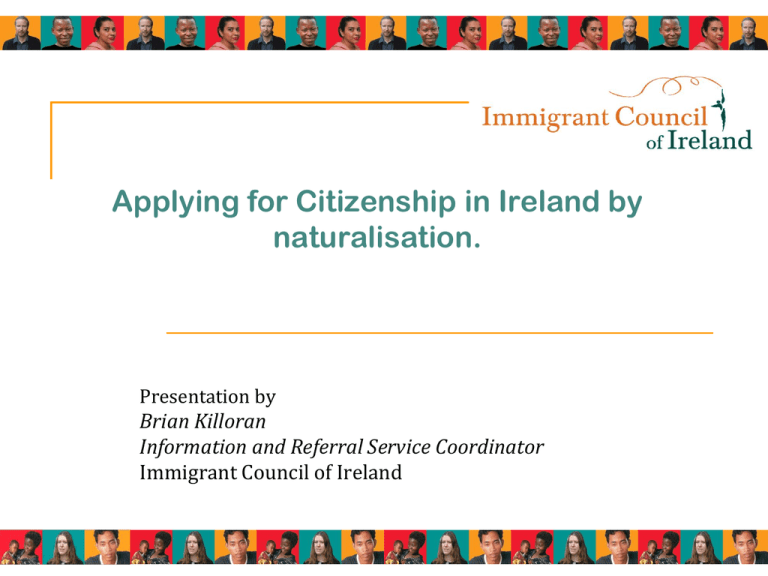
Applying for Citizenship in Ireland by naturalisation. Presentation by Brian Killoran Information and Referral Service Coordinator Immigrant Council of Ireland Applying for Citizenship in Ireland. by birth, if certain criteria are fulfilled, no longer automatic since 1 January 2005 by descent, if parents or grandparents born in Ireland are citizens and certain criteria are fulfilled by naturalisation following a period of residence in Ireland Criteria for adult naturalisation: Be aged over 18 years old Be of ‘good character’ (not defined) Resided lawfully in Ireland for at least five years in previous nine years Intend to continue living in Ireland if naturalisation granted Swear a declaration of fidelity and loyalty to the State The above is the criteria to apply, the process is discretionary and is decided by the Minister for Justice, Equality and Law Reform. Reckonable Residency: Certain types of residence are not recognised for the purposes of applying for citizenship: living in Ireland as an international student asylum seeker or any time spent unregistered with the GNIB pending renewal of work permits or other immigration status ‘Reckonable Residency is time spent registered with the Garda National Immigration Bureau on a type of status that counts towards naturalisation. Spouses of Irish Citizens… Must be married for three years and marriage still valid & subsisting Must be resident in Ireland continuously for the 12 months immediately prior to the application. Resident in Ireland for at least two years of the four years preceding the application Processing time is the same The Application Process: In the case of adult applicants, the application form is Form 8. For naturalised adults applying for their minor children, this is a Form 9. The forms are available on the INIS website www.inis.gov.ie in the Citizenship Section. Supporting documentation – checklist. Application must be signed by three Irish citizen references and sworn by a solicitor or Commissioner for Oaths. There is no fee for applying but, if the application is successful, then there is a fee of €950 (adult) or €200 (minors, widow/widower of Irish citizen). There is no fee for refugees or stateless persons. The Application Form: Take your time filling in the form, mistakes can cause delays. Use of Tippex or ‘crossed out’ sections will likely cause the form to be returned. - - - - - Section 4: previous addresses: must give all addresses for last nine years (or five years if a spouse of Irish citizen), not just addresses in Ireland Section 5.5 and 5.6: only complete if any period of residence in Ireland was for international study. Not relevant if you happened to have been studying if your residence was on some other basis (refugee, employment permit, IBC/05 etc) Section 6: do you intend to live in Ireland: you must tick YES Section 7: marital status: must answer correctly, check if you do not understand. e.g. have seen some tick single when they have no contact with spouse but are in fact separated Section 12: criminal offences, etc. Even if no conviction but charged, you must put details of matter in section 12.7 Lodging the Application: If you are satisfied that you have completed the form fully and have all of the documentation ready: Not required but useful to have a covering letter, setting out any further information you think relevant (i.e. qualifications, request to waive residence requirement, etc) Keep a copy of the application form and all of the documentation you provide Send application to the Citizenship Section, DJELR, Tipperary Town. The full address is provided on the Checklist. Send by registered post and keep the receipt. Citizenship Division acknowledges receipt – 4 to 6 weeks. Current stated processing time if 2 years – this can be longer in some cases. Applicant will receive a reference number for their application. Starting with 68/……/ Applications are ‘screened’ upon receipt – may be returned for errors, applying too early, incorrect documentation attached etc. Notify the Citizenship Division of: Change of Address Change of name Change of marital status Change of immigration status. Maintain Immigration Status: The applicant is required and advised to maintain their immigration status while the application is being processed. If Citizenship is Granted: You will be notified in writing of a positive decision. You will now need to swear an ‘Oath of Fidelity’ to the State. This is done at a District Court. Following this you return the declaration and required fee to the DJELR who then issue a Certificate of Naturalisation. Following this, you can then apply for an Irish Passport if you so wish. If the application is refused: The main reasons why applications appear to be refused, include: The applicant does not satisfy the eligibility criteria (including residence, if that was not detected at the early stages of screening the application or if the Minister has been requested but is exercising discretion not to waive the residence period) The applicant has been in receipt of social welfare payments (not including Child Benefit). This does not necessarily affect applications made by refugees. The applicant has been convicted of criminal offences or has come to the ‘adverse attention’ of An Garda Siochana No formal right to appeal a refusal. Possible to seek legal advice concerning having a decision judicially reviewed. Very lengthy, complicated and in some cases expensive procedure. Possible to reapply for naturalisation. In Summary: Process is discretionary: you may be eligible to apply but there is no entitlement to naturalise Frequent delays: although stated to be currently 2 years, frequently it can take much longer and it is not unusual to be at least three years or more Don’t apply in haste: take time to ensure form correctly filled and all documents attached as this will facilitate the smooth processing of the application Maintain your immigration status while pending and notify relevant changes Thank you!
